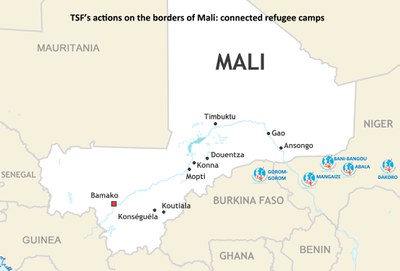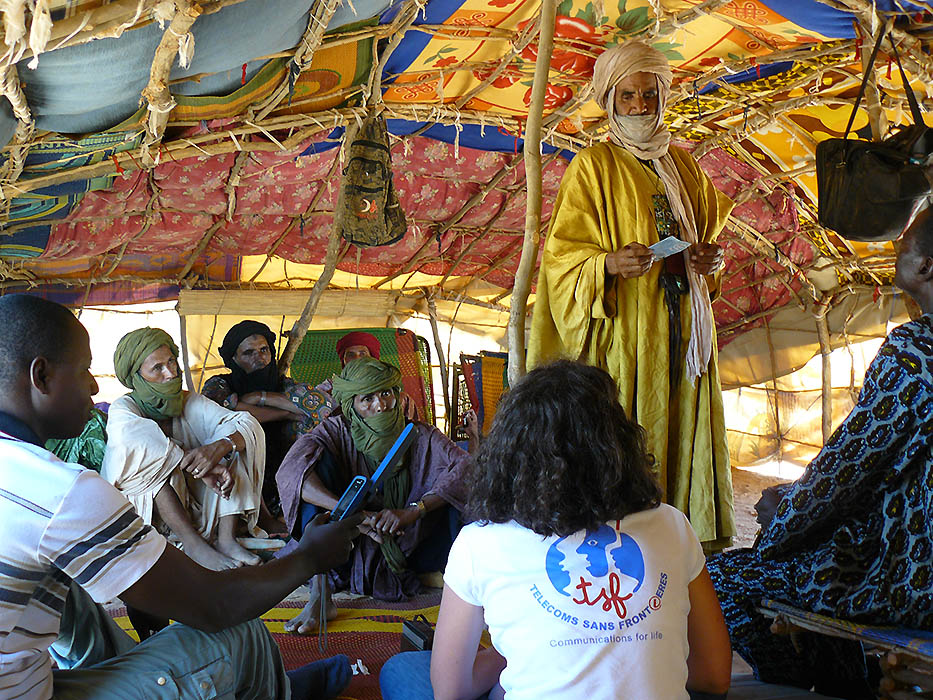Strengthening coordination in Malian refugee camps
Context: Conflict
Start date: 13/04/2012
End date: 31/12/2015
Areas of intervention: 6 refugee camps on the border of Mali
- Abala, Banibangou, Tabareybarey and Dakoro camps in Niger
- Gorom-Gorom and Djibo camps in Burkina Faso
Activities:
- Support to coordination
- Connectivity for humanitarian actors
- Capacity building
6 refugee camps connected
70 GB of data transferred per month
20 NGOs supported
Context
In the Sahel, security conditions deteriorated sharply in March 2012 with the massive arrival in Mali’s bordering countries of thousands of refugees, most of them women and children, fleeing fighting between Tuareg rebels and the national army. Grouped within the National Movement for the Liberation of Azawad (MNLA), the rebels launched, in mid-January 2012, an offensive against the Malian army to demand the independence of Azawad, the Sahel region of Mali where the Tuareg people are mainly settled. The rebels stormed several cities in the north of the country pushing the civilian population to the south.
At the peak of the civil war between 2012 and 2013, there were more than 353,400 internally displaced persons in Mali and nearly 175,000 Malian refugees in neighbouring countries - 52,600 in Niger and 108,000 in Burkina Faso - according to the United Nations High Commissioner for Refugees (UNHCR).
In Niger, a few thousand refugees lived in cities of Ayorou and Niamey, the capital; the majority was hosted in one of five camps established by UNHCR in the Tillaberi and Tahoua regions.
Governmental and economic instability as well as the lack of basic social services such as health, education and sanitation prevented displaced populations from returning to their home land. As a result, Malian refugees remained in the camps for several months or even years until the security and socio-economic situation in northern Mali was stable again.
However, the bordering areas of Burkina Faso, Niger and Mauritania where refugee camps were located have suffered serious drought in previous years, causing food and water shortages, leading to difficult hosting conditions.
Deployment
On 13th April, Télécoms Sans Frontières deployed an emergency team in Niger, in the Tillabéri region in the south-west of the country, to strengthen support to these vulnerable populations. TSF assessed telecom needs in refugee camps in order to determine other areas of intervention.
In collaboration with ACTED, the Camp Management lead organisation, and in consultation with UNHCR, TSF provided fixed satellite devices to connect refugee camps, and mobile devices to connect teams on the move. These high-speed, reliable and fast satellite communication means have allowed better coordination of humanitarian organizations in the field.
TSF's support was requested by Action against Hunger Spain (ACF-E) to develop its activities in the Tillia camp, Tahoua region in western Niger. Following constant arrivals of refugees, ACF-E and its various partners wanted to settle in the district to monitor the situation of displaced populations. But access to this area was very dangerous and the safety of humanitarian workers was a major challenge.
On July 11th 2012, Télécoms Sans Frontières opened an Internet centre in northern Burkina Faso, in Gorom-Gorom, in the offices of Vétérinaires Sans Frontières Belgium (VSF-B), to enhance the communication of NGOs and United Nations agencies in the area thanks to the installation of a Vsat satellite antenna. TSF also supplied VSF-B with a Bgan connection to ensure the communication with the teams and the transmission of crucial data during missions in isolated areas.
Support to humanitarian coordination
Since most of the camps were located in remote areas, the services offered by TSF enabled the organizations to communicate effectively with their offices in the capital, as well as with their partners, ensuring a better implementation of their activities and thus responding more effectively to the needs of refugees.
Fixed satellite connections have allowed camp managers and logisticians to have reliable and secure on-site connections, minimizing their movement in areas where security conditions were extreme. Camp management organizations were able to:
- Remotely share their status and activity reports,
- Collect vital data,
- Anticipate new arrivals of refugees,
- To be informed of possible epidemics,
- Assess future needs,
- Optimize camp coordination (infrastructures and shelters, health, hygiene, protection, security, etc.).
TSF's satellite equipment optimized the emergency relief operations, but also the longer-term management of the camps. Camp management was based on a multi-sectorial model in which TSF and all the actors involved worked together and exchanged expertise in their respective fields to develop solutions adapted to the needs of refugees. It was essential for the camp manager to ensure the coordination of the various services and the proper implementation of the activities.
- Niger
Abala refugee camp (April 2012 – December 2015)
Bani Bangou refugee camp (June – Sept. 2012 / June - December 2013)
Mangaizé refugee camp (July 2013 – December 2015)
Tabareybarey refugee camp (December 2013 – December 2015)
- Burkina Faso
Gorom Gorom refugee camp (July 2012 – May 2015)
Djibo refugee camp (July 2012 – March 2013)
Connectivity for humanitarian actors
In those areas where security was a daily challenge and where escorts were recommended for all travel, effective telecommunication solutions reduced the impact of the crisis on the population by strengthening the coordination capacities of humanitarian actors and allowing better dissemination of field information. Mobile satellite connections enabled to exchange reports and statistical data on the food situation. TSF teams provided installation and training in the use of the equipment provided.
"With the problems experienced on the local network, without TSF it would have been impossible for us to communicate our reports with the office in Niamey and the partners. Thanks to the TSF connections, continuous communication was assured, as is the quality of coordination",
ACTED Camp Manager Assistant.
National capacity building
In 2013, TSF also trained 25 IT staff working in West African NGOs. The training covered the broad areas of required knowledge to establish connections in emergencies, including the installation of VSAT systems. These are systems that have allowed Internet access from refugee camps on the border of Mali.
See our mission factsheet: International Workshop - Enhanced Response Capacity.


























